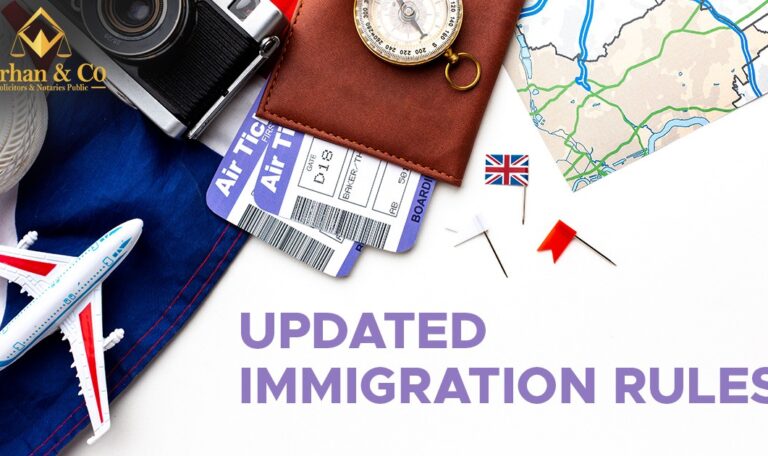UK immigration Rules are continuously in the process of change. For most, such updates result in anxiety and confusion. You could be a skilled worker, student, or family planning to settle, but updates in the immigration laws will seem daunting. You begin looking for good counsel, seeking straightforward answers. Numerous care workers and healthcare professionals are concerned about the impact of new immigration regulations on their future in the UK. But here is the better news: the latest developments are intended to provide more assistance, particularly for care workers and the health sector. At Farhan & Co., we know the value of staying up to date. We walk families, students, and employees through each new development, helping you feel secure and ready. Here in this blog, we will make clear what the new 2025 immigration rules entail, why they’re significant, and how we can assist you in dealing with them. What’s Changing in the Immigration Rules in 2025? The British government has introduced fresh changes to the immigration rules in 2025. These revisions centre on the facilitation of skilled workers, particularly from the healthcare and care industries. As medical professionals and care workers are increasingly in demand, the government is trying to streamline the visa system and enable them to work and settle in the UK more readily. One of the largest changes is the opening up of the Skilled Worker visa. Care workers and senior care workers are now formally recognized as important occupations under the Skilled Worker route. As a result, they are able to apply for visas more straightforwardly and be able to bring their families with them. Another key reform is more rigorous government inspections to guarantee employers comply with reasonable working conditions. Although this may seem concerning, it’s intended to safeguard care workers from exploitation. The regulations ensure employers offer reasonable pay, appropriate job descriptions, and a secure working environment. Why Care Workers and Medical Professionals Should Care If you are a care worker or a medical professional, these changes are significant. Many workers from overseas were previously unsure whether they could bring their families or extend their stay in the UK. The updated immigration rules now give more clarity. For example, care workers who get jobs under the Skilled Worker visa can now: Apply for permanent residency after 5 years. Bring their spouse and children. Access better pathways to settlement. This is a huge relief for many who were stuck in uncertain situations. Families can now plan their future without constant fear of sudden policy changes. How Government Inspections Affect Skilled Worker Visas The new legislation also translates to increased government inspections for companies sponsoring Skilled Worker visas. The reason is to ensure that firms hire within ethical parameters. For skilled workers, this is a blessing. It guarantees that you will be working with real employers who value your rights. Employers are now required to: Provide contracts with proper job descriptions. Pay wages that are above the threshold levels. Offer safe and legal working environments. Although inspections cause delays in processing, they provide long-term safeguarding of workers. The government would like the immigration system to be fair to all. Impact on Students and Families Planning for the Future The immigration rules in 2025 are not only about care workers. Students and families are also affected. Many students worry about their chances of staying in the UK after completing their studies. With the new updates, the Graduate Route remains active, allowing students to work for two years after graduation. Families of skilled workers now have better support as well. Dependents can: Apply for visas more smoothly. Access work and study rights. Follow clearer pathways towards settlement. However, visa requirements still need careful attention. Mistakes in applications can cause delays or refusals. That’s why professional advice is so important. How Farhan & Co. Helps You Navigate Immigration Rules Well aware of how stressful immigration processes can sometimes be, at Farhan & Co., the new law would bring new challenges but also boost opportunities. Our team keeps updating itself with every change in UK immigration policies, so you have nothing to worry about. Services Offered: One-on-one consultations to understand your situation. Guidance every step of the way for a Skilled Worker visa application. Support for students as well as their post-study work. A lot of advice for families wishing to settle in the UK. Handling employer sponsorship compliance. Our approach is simple, focused, and clear to make the entire immigration journey smooth. We know every case is different, and therefore, we offer solutions that are personalized. Don’t Let New Rules Hold You Back, Plan with Confidence I mean to say that immigration rules are always changing and not easy to catch up with. These changes can be confusing and stressful for different care workers, medical professionals, students, and families alike. But you don’t have to face them alone. Introducing the all-new immigration rules for 2025, for offer a lot of help. It basically protects skilled workers, builds better settlement pathways, and provides a very good ethical recruitment policy. Though it’s not simple, opportunities can surely be conjured from this situation with intelligent guidance. Farhan & Co. is here for you. We have helped numerous clients to apply for or extend their stay and even bring family members to the UK. Our expert team will help you understand the latest rules and take the right step towards your care. Conclusion Every alteration in immigration law brings with it uncertainty, but always offers newer opportunities for progress. Be it an aid worker, a student, or a family who is yearning for something better in the UK, the latest immigration rules present an opportunity that did not exist previously. Farhan & Co would always wish to assist you in making informed decisions. We appreciate the importance of this journey to you and your loved ones. With our experience and in-house reliable knowledge, we give you sound advice and professional support. So, if you want clear answers and hassle-free, easy..










